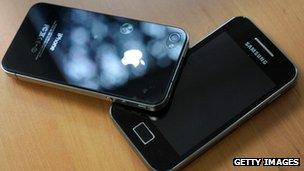EU accuses Samsung of patent abuse in Apple lawsuits
- Published

Samsung had attempted to force some of Apple's devices off store shelves in Europe
EU competition regulators probing Samsung's patent litigation tactics believe the firm has abused its position.
The European Commission's "preliminary view" follows the South Korean firm's efforts to ban Apple products.
Investigators took issue with the fact that Samsung had based its claims on patents which lie at the heart of industry-shared technologies.
A final ruling will be issued once Samsung has presented its defence.
The two firms make the world's bestselling smartphones - the Galaxy S3 and the iPhone 5. They have been engaged in a range of patent battles across the globe despite the fact Apple buys some of its components from its rival.
Frand obligations
At the core of the EU's concerns is Samsung's use of what are termed "standard-essential" patents - specifically innovations without which Apple devices could not offer 3G mobile data connections.
Firms register patents as being standard-essential because it is supposed to guarantee them an income from anyone who wants to make use of a commonly offered technology. Other examples include the MPEG movie format and MP3 music standard.
In return for being granted such status the company commits itself to licensing an invention under Frand rules - meaning the terms must be fair, reasonable and non-discriminatory.
Companies owning Frand-registered innovations agree that they cannot discriminate who gets to use their inventions so long as they are paid a fee which cannot be excessive.
After Apple and Samsung failed to agree royalty rates for some of the Asian firm's 3G-related patents, Samsung launched lawsuits in Germany, the Netherlands and elsewhere.
Bearing in mind Apple was not opposed to the principle of paying a fee but had rather disagreed about the amount being demanded, the Commission said that Samsung's efforts to seek sales injunctions "harms competition".
"Intellectual property rights are an important cornerstone of the single market," said competition commissioner Joaquín Almunia, external.
"However, such rights should not be misused when they are essential to implement industry standards, which bring huge benefits to businesses and consumers alike.
"When companies have contributed their patents to an industry standard and have made a commitment to license the patents in return for fair remuneration, then the use of injunctions against willing licensees can be anti-competitive."
Cooperation promise
The Commission first announced it was probing Samsung over possible patent rights abuses in January.
Earlier this week the Galaxy phone maker said it would drop its attempts to ban some Apple products in Europe on the basis of its Frand-type wireless patents.
If the move was designed to convince the EU to drop the probe it failed.
A statement from Samsung said: "We are studying the statement and will firmly defend ourselves against any misconceived allegations.
"We will continue to fully cooperate with the Commission. Samsung is confident that in due course the Commission will conclude that we have acted in compliance with European Union competition laws."
- Published18 December 2012
- Published10 October 2012
- Published8 March 2012